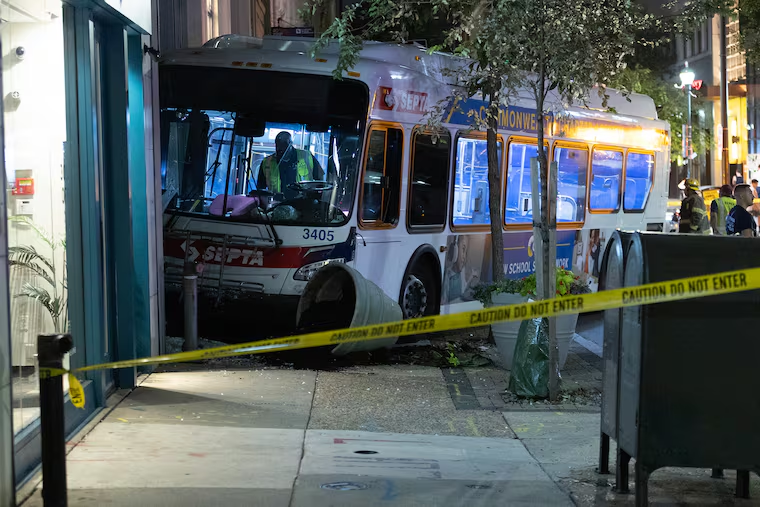Federal transit agency: ‘SEPTA has not taken effective actions’ following string of bus and trolley crashes
The transit agency will begin safety trainings for all employees next week.

SEPTA announced Thursday that it would start “safety reinforcement” training for all employees on Monday and federal regulators say they are stepping in with a formal review of the transit authority’s maintenance and safety protocols after recent bus and trolley crashes that killed one person and injured at least 40.
Eight major collisions involving SEPTA vehicles in the past 20 days have drawn intensifying scrutiny from state and federal safety regulators.
Riders will experience delays as about 10% of SEPTA’s bus and trolley operators will be pulled from duty each day for the training sessions, officials said. “We expect the main service impacts to be within the first two to three weeks,” SEPTA spokesperson Andrew Busch said, with delays easing as the training moves on to workers in the bus and trolley maintenance depots.
» READ MORE: SEPTA says 5th crash in a week is ‘alarming and concerning,’ plans to investigate staffing issues
Separately, the Federal Transportation Administration said it was going to conduct a detailed inspection of SEPTA’s safety “protocols, practices and processes” — the regulatory agency’s second expression of concern over crashes on the system in the last five months.
FTA disclosed the new action Thursday in a letter obtained by The Inquirer and addressed to SEPTA General Manager and CEO Leslie S. Richards and state Transportation Secretary Michael Carroll. PennDot has primary oversight responsibility for transit rail operations in Pennsylvania.
Top FTA officials have spoken with Richards and other SEPTA executives about the series of major collisions, including five within a single week in late July, the letter said.
“To date, however, SEPTA has not taken effective actions to prevent and address continuing safety conditions,” according to the letter, which was signed by Joseph P. DeLorenzo, the FTA’s associate administrator and chief safety officer.
While SEPTA is taking steps to improve safety, FTA acknowledges, it is undertaking the inspection “due to the gravity of the situation” and at the request of the agency’s administrator, Nuria Fernandez, the letter said. The inspection of maintenance and safety protocols will inform steps to build a “robust safety culture” at SEPTA, DeLorenzo wrote.
“The safety of our customers and employees is always our top priority, and we are redoubling our efforts,” Richards said in a statement announcing the training effort. “The recent series of accidents has caused us to look internally with a critical eye to ensure we embrace safety as a core value every day.”
Ultimately all of SEPTA’s employees, including those in headquarters jobs, will undergo the safety training, Busch said. He added that it could take about eight weeks.
Already, the independent National Transportation Safety Board, the agency perhaps best known for investigating catastrophic airline crashes, is formally looking into the July 27 runaway trolley crash. An out-of-service SEPTA trolley with a mechanic aboard rolled out of a rail yard, struck an SUV, and then smashed into the ground floor of a historic home in Southwest Philadelphia.
PennDot and the FTA are participating in that investigation.
In March, the FTA urged PennDot to sharpen its oversight of SEPTA, expressing concern about several “safety events” in late December 2022 and February of this year, including a trolley collision with a bus in West Philadelphia; two trolleys colliding at Elmwood Yard; a runaway train at Bridge Street Yard; and a collision between trains at the Fern Rock Carhouse.
SEPTA urged customers to check the SEPTA website or app for service updates when planning travel or SEPTA’s account on X, formerly known as Twitter. Customer service representatives are available by phone at 215-580-7800.